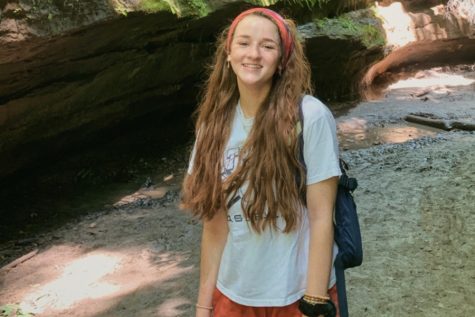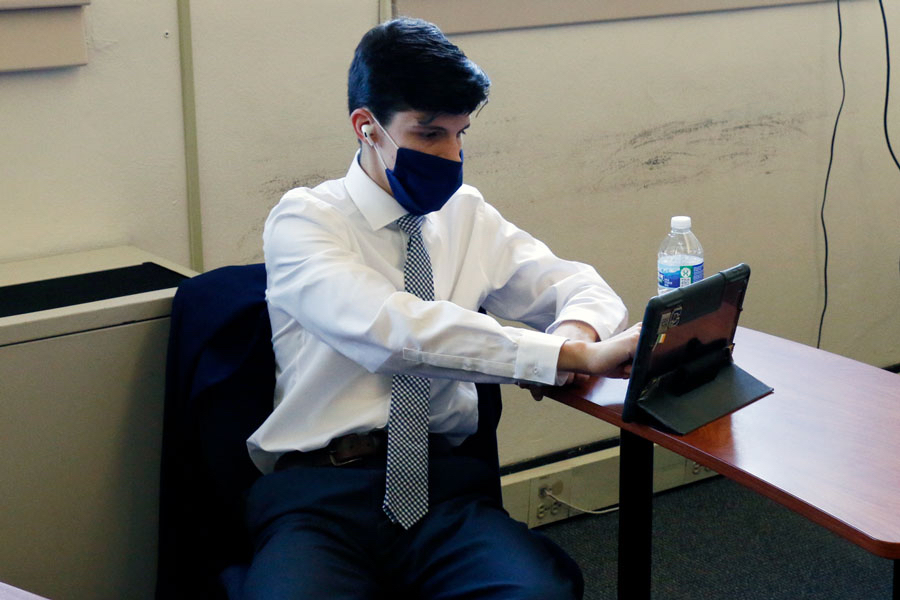Teachers provide historical perspective on election
More unites us than divides us, they say
Dressed up for both school pictures and Election Day, senior Eric Dickey casts his vote in the mock election during B period on Nov. 3.
The events of this year have left a looming sense of anxiety lingering in the American people in response to the massive losses and conflicts suffered throughout 2020.
The inevitable stress induced by the presidential election is no different. Since the origins of President Donald Trump’s administration, the American political climate has been intensely and uniquely polarized, making this election feel especially pertinent to many voters across parties.
To model this election, social studies teacher Mrs. Jill Twilleager conducted a school-wide mock poll on Nov. 3 The results — Trump winning with 52% of the student vote — were announced the following day.
However, this timeliness was reciprocated on a national scale, but of course, the entire nation had a few for more ballots to count.
After waiting for months as the election dwindled forward, feeling overwhelmed by debates and nervously checking poll numbers during spare moments, Americans have held their breaths as they waited for the election results to be announced. Four days later, they were.
Election feelings
Social studies teacher Mr. Craig Blanchet described the election in one word as “stressful.”
“One of the things (voters) are anxious about when it comes to an election is that their voices will be heard. I think the most important thing to calm anxieties or reduce stress is for us to make sure that the process is fair,” he said.
Several other social studies teachers, including Young Democrats moderator Sr. Mary Ann Stewart and Young Republicans moderator Mr. Mark Noe, shared these sentiments. Stewart said she was shocked at how “passionate” and “anxious” this year’s voters were, while Noe said he considered the entire election to be largely “chaotic” due to massive voter turnout and Covid-19 complications.
According to Blanchet, a majority of this election chaos is rooted in uncertainty and challenges with modern media. He said, “Uncertainty and not knowing results, especially for the American citizen, who’s used to instant results, is really a large part of what adds to people’s stress.”
Blanchet cites this accustomization to immediate information as being a result of the nature of our modern news cycle, he said, “It’s really difficult for the average citizen to be able to discern fact from fiction, and I think journalists could help that citizen do a better job.”
Noe reiterated this concern, saying many media outlets have played what he called a “monstrous role” in the election. As a Republican leader, Noe feels that several publications are “very biased” toward left-wing politics, saying, “We’ve always been very divided. I think the media fuels it though.”
Politics on the Hill
Indiana has historically held a staunchly Republican reputation. From 1964 to this year, only two Democratic candidates for President, Lyndon B. Johnson and Barack Obama, carried the state.
Blanchet said that he would describe the school’s political environment as being “classically Republican,” as a large portion of the student body comes from conservative families. Because of this, he and several of his colleagues were unsurprised by Trump’s win in the school election.
Many students and families are passionate in their support for President Trump. For example, senior Jack Kleck, leader of the Young Republicans, said, “No one has done better for the economy” than the current President. Kleck said this year was his first time voting, and though he is “disappointed that (Democratic voters) seemed to just neglect” economic issues he deems essential, he said he is mostly “just glad that this year’s election was one of record turnout in the U.S. I hope that becomes a trend for the future.”
These thoughts were echoed by Noe, who commended Trump, saying, “Everyone’s retirement plan, even with Covid, has gone up 32% in the past four years.” Furthermore, though many consider the school to foster a Republican majority, Noe guessed that the population was “80% progressive and 20% conservative,” favoring liberals.
While Sr. Stewart believes that the student body is mostly Republican, she and the Young Democrats represent a liberal perspective within the school. For Sr. Stewart, this election year is especially pressing because “the cost of healthcare is so incredible at this point.” She said, “I like Biden a great deal.To me healthcare is a right to life issue. Right now, especially with Covid, that is the Number-1 issue. It’s really what I voted on.”
She went on to say “I don’t consider either party to be pro-life” from a Catholic perspective; for Sr. Stewart, advocating a pro-life stance goes beyond abortion legislation and includes healcare and prison reform as well.
Furthermore, Sr. Stewart reflected on the ways that political polarization has affected her daily life. “It is a very divisive time,” she said, “I’ve seen it within my family. I think one half of the country can’t understand how the other half could support a particular candidate, and I’m sure (the other side is) saying the same thing.”
Bridging the gap
The conflicting political climate has only amplified election stress and interpersonal tension, and has an inevitable potential to leave the student body feeling disenfranchised. To combat this, Blanchet said he wants students to remember “your vote doesn’t totally define you. It is part of being a responsible citizen.”
For students, he said, “You also have to know when you’re walking the hallways around Cathedral, you never are on a political island. We truly walk and talk to a higher calling than politics.”
For the school’s future, and the country’s, Blanchet said he was optimistic. He concluded by saying that to come together, people should rise above the pettier parts of politics. “I think you guys are better about doing what’s in front of you for the day, and understanding what you value in your friends and in your colleagues.
“Sometimes we like to say that as we get older we get wiser, but we also sometimes get more set in our ways. I think you guys should use your open mindedness, your kindness, and your Christian core belief to be able to process something that’s not everything, but that’s just a part of the world. Politics are just a part of the world. I think you guys are actually in some ways better equipped to deal with that than older people.”

Senior Tory Basile is a reporter on the Megaphone staff. She paints the sets for the Cathedral theater and is involved in Irish Engineers. She is planning...







